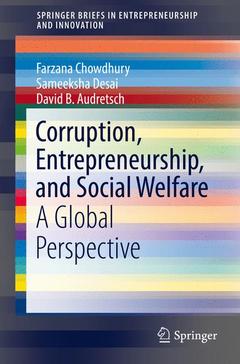Corruption, Entrepreneurship, and Social Welfare, 1st ed. 2018 A Global Perspective SpringerBriefs in Entrepreneurship and Innovation Series

? Is corruption an additional burden in extensive regulatory environment on different types of entrepreneurship---necessity entrepreneurship, opportunity entrepreneurship, total entrepreneurial activity, self-employment, and newly registered firms?
? Is corruption helpful for entrepreneurs who have aspiration to operate outside their home country border in highly regulated environment?? How does corruption affect income distribution generated through entrepreneurial activity?
Entrepreneurship is an important factor for local and national economies as it generates employment and income that are crucial for economic development. Corruption can significantly influence the nature of decisions made by entrepreneurs, with profound effects on business creation, institutional development, and economic performance. For example, an entrepreneur with resources and networks might be able to influence the regulatory agencies to overlook violations, expedite permits, or bribe corrupt program administrators to violate the rules of distribution, exacerbating income inequality and obstructing economic growth and development. While corruption is not a new phenomenon, the current globalized economy has introduced trade into the corruption question as globalization puts pressure on countries to open borders to attract investments and gain a competitive advantage. However, many country level institutions do not always change as fast as the economic activity across borders, which can encourage corruption in order to bypass inefficient regulations and to successfully engage in entrepreneurship. The authors of the book examine this phenomenon.
Featuring policy implications and case studies, this book will appeal to graduate students, academics, professionals, practitioners, and researchers in entrepreneurship, international business and public policy.
David Audretsch is a Distinguished Professor and Ameritech Chair of Economic Development at Indiana University, where he is also serves as Director of the Institute for Development Strategies. He also is an Honorary Professor of Industrial Economics and Entrepreneurship at the WHU-Otto Beisheim School of Management in Germany. In addition, he serves as a Visiting Professor at the King Saud University in Saudi Arabia, Honorary Professor at the Friedrich Schiller University of Jena in Germany, and is a Research Fellow of the Centre for Economic Policy Research in London.
Audretsch's research has focused on the links between entrepreneurship, government policy, innovation, economic development and global competitiveness. His recent books include Entrepreneurship and Economic Growth (Oxford University Press) and The Entrepreneurial Society (Oxford University Press). He is co-founder and co-editor of Small Business Economics: An Entrepreneurship Journal. He was awarded the 2001 Global Award for Entrepreneurship Research by the Swedish Foundation for Small Business Research. In 2008 he received an honorary doctorate degree from the University of Augsburg, and in September, 2010 he received an honorary doctorate degree from Jonköping University. In 2011 he was awarded the Schumpeter Prize from the University of Wuppertal.
He is a member of the Advisory Board to a number of international research and policy institutes, including the Deutsches Institut fuer Wirtschaftsforschung (German IExplores the complex relationships between entrepreneurship and corruption in developed and developing countries?
Examines the role of corruption on various types of entrepreneurship and social welfare
Features policy implications, case studies and practical consequences of corruption and entrepreneurship
Includes supplementary material: sn.pub/extras
Date de parution : 10-2017
Ouvrage de 98 p.
15.5x23.5 cm
Thèmes de Corruption, Entrepreneurship, and Social Welfare :
Mots-clés :
Business Environment; Corruption; Economic Development; Entrepreneurship; Social Welfare



